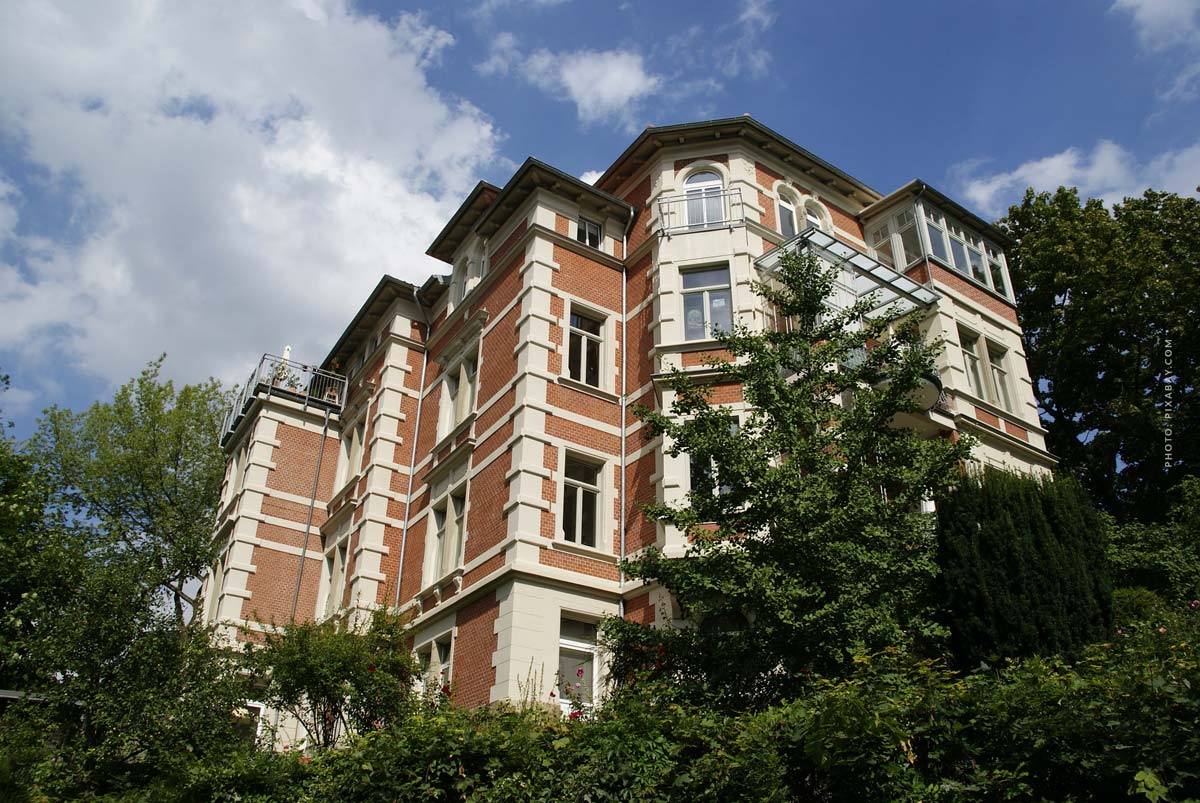Selling real estate Taxes: Apartment, house, property – speculation tax, checklist & more
Taxes when selling real estate – When selling a property, whether a condominium, house, apartment building, commercial property or land, you will learn everything you need to know about taxation when selling real estate 2026: Who pays the real estate transfer tax? How high is the speculation tax? Plus tax optimization when selling in the form of a GmbH and holding company. Real estate and taxes 2026! PS: My tip: the right experts and real estate tax coaching (not from a tax consultant, but from investors with practical experience). I will be happy to put you in touch with my experts, just write to me: Contact.
Real estate transfer tax: buyer or seller?
The first important question for those selling for the first time: As a seller, do you have to pay land transfer tax? Good news! This tax is payable by the buyer.
Buyers pay land transfer tax, not you as the buyer.
As a rule, the real estate transfer tax ranges between 3.5 percent and 6.5 percent, depending on the federal state in which the property or plot of land is located. For quick orientation, we have summarized the real estate transfer tax rates for all 16 federal states here, with example purchase prices from 1 to 5 million euros, from Bavaria to Hamburg.
- Real estate transfer tax – table and calculation example
This tax is important for you:
Speculation tax: selling tax-free, when?
The speculation period explained more quickly:
- Owner-occupied = 3 years
- Rented = 10 years
If you sell within the speculation period, you must – simply put – pay tax on the profits as normal, just like income from work, regardless of whether you are employed or self-employed. After the period has expired, the sale is tax-free. If you want to do a quick calculation, use my free speculation
Tax calculation: Example
If you sell within the speculation period, you must – simply put – pay tax on the profits as normal, just like income from work, regardless of whether you are employed or self-employed. As a single person, this would typically mean a top tax rate of 42%.
Sale within the speculation period (< 10 years) as a private individual:
- Purchase 2024 = 2,100,000 euros
- Sale in 2033 = 4,100,000 euros
- Taxable profit = 2,000,000 euros
- At 42 % (single person) = 840,000 euros
Sale within the speculation period (< 10 years) as a company:
- Purchase 2024 = 2,100,000 euros
- Sale in 2033 = 4,100,000 euros
- Taxable profit Berlin approx. 19.1 % (trade tax 4.1 %, corporation tax 15 %) = EUR 2,000,000
- At 19.1 % = 382,000 euros
Sale after the speculation period (> 10 years):
- Purchase 2024 = 2,100,000 euros
- Sale in 2034 = 4,100,000 euros
- Taxable profit = 2,000,000 euros
- Tax free
But you can’t buy 10 properties now, wait 3 years and take the profits from property appreciation, because:
3 objects rule in Berlin
There is also the 3-property rule. If you sell more than 3 properties in 5 years, it is commercial real estate trading.
When selling real estate, the “3-object rule” refers to the fact that private individuals in Germany can sell up to three properties within a five-year period tax-free. If a person sells more than three properties within this period, this is considered commercial real estate trading and is subject to income tax – even if they are not rented out but are owner-occupied.
After 10 years of holding, however, the sale is always tax-free.
Why does this rule exist?
Just like the speculation tax, the rule is intended to curb speculation on the real estate market and encourage the sale of real estate for residential purposes.
So how do the “big players” save on taxes?
Commercial property: Value added tax
When selling a commercially used property that is subject to VAT and is rented out, the seller must correct the input tax deduction. If the new owner continues to let the property, no refund of input tax will be granted.
- Commercial properties subject to VAT require an input tax adjustment on sale
- The continuation of the rental does not affect the input tax refund for the seller
Share deals: selling a company “instead of” real estate
One option for a tax-optimized sale is the share deal. In this case, however, the property must already have been purchased by a company (such as Immobilien GmbH) (not as an individual).
The typical sale: “asset deal”
The difference: In an asset deal in the real estate context, specific assets such as land and buildings are sold individually, whereas in a share deal the shares in the company that owns the real estate are transferred.
Simply put:
- Asset deal = property is sold
- Share deal = Immobilien GmbH is sold
A share deal means that the buyer does not acquire the property itself, but the – in this case – Immobilien GmbH. Here is a short infographic. Then back to the direct sale of a property, after which I will explain more about holding companies and taxes on the sale.

Only 1.54% tax on sale
A share deal is possible if you have the company in a holding structure. This means you only pay 1.54% tax due to the intercompany privilege(Section 8b KStG).
- Asset deal = property is sold
- Share deal = company is sold (with real estate ownership)
Let us now calculate our example again, starting with the direct sale of a property:
Sale of a property as a company (asset deal):
- Purchase 2024 = 2,100,000 euros
- Sale in 2028 = 4,100,000 euros
- Taxable profit Berlin approx. 19.1 % (trade tax 4.1 %, corporation tax 15 %) = EUR 2,000,000
- At 19.1 % = 382,000 euros
Sale of a real estate GmbH as a company (share deal):
- Purchase 2024 = 2,100,000 euros
- Sale in 2028 = 3,100,000 euros
- Taxable profit = 1,000,000 euros
- For GmbH 1.54 % = 1,540 euros
You can see how huge the difference is.
No real estate transfer tax on purchase
Let’s delve a little deeper into the subject of real estate and tax optimization!
Again, simply put:
- Sale of Immobilien GmbH below 89% = no real estate transfer tax
Why is this the case? In Germany, the sale of shares in a GmbH that owns real estate is not normally subject to real estate transfer tax as long as the shares are below a certain percentage(§ 5 GrEStG).
What is the advantage? Real estate as a capital investment must bring a profit, usually calculated by the rental yield. The land transfer tax increases the purchase price by up to 6.5%, depending on the federal state. For 1 million euros, this is a cost of 65,000 euros. This directly increases the yield by a few percent.
Taxes on gifts and inheritance
If your property is an inherited or gifted property, this also raises the question: What taxes are due? As with properties you have purchased yourself, speculation tax may also be payable on the sale of an inherited property.
However, one special feature should be noted:
Thus, the speculation period does not begin on the day the property was inherited or given away, but on the day it was purchased by the original owner.
If the property is a newly inherited rental property that was acquired more than 20 years ago, the speculation period is deemed to have expired. There is therefore no speculation tax, even if you have only recently inherited the property.
To summarize:
- Speculation tax may apply
- Only for rented or leased properties
- The speculation period begins on the day of the original acquisition
Save tax with real estate
Reading tip! Save taxes with real estate – Learn about taxing taxes! You are the greatest financial professional you can find for your individual setting (private and business). Calculating taxes yourself is the tool to minimize your own tax burden.
The aim is therefore to convert taxes into private assets
The less tax you have to pay to the tax office, the faster you can build up your private wealth. You can find out more about tax optimization in this guide.
Want to learn more?
Real estate & tax coaching
Real estate & tax coaching from experts and investors. I am happy to bring you together with the best:
Here you can find more for:













